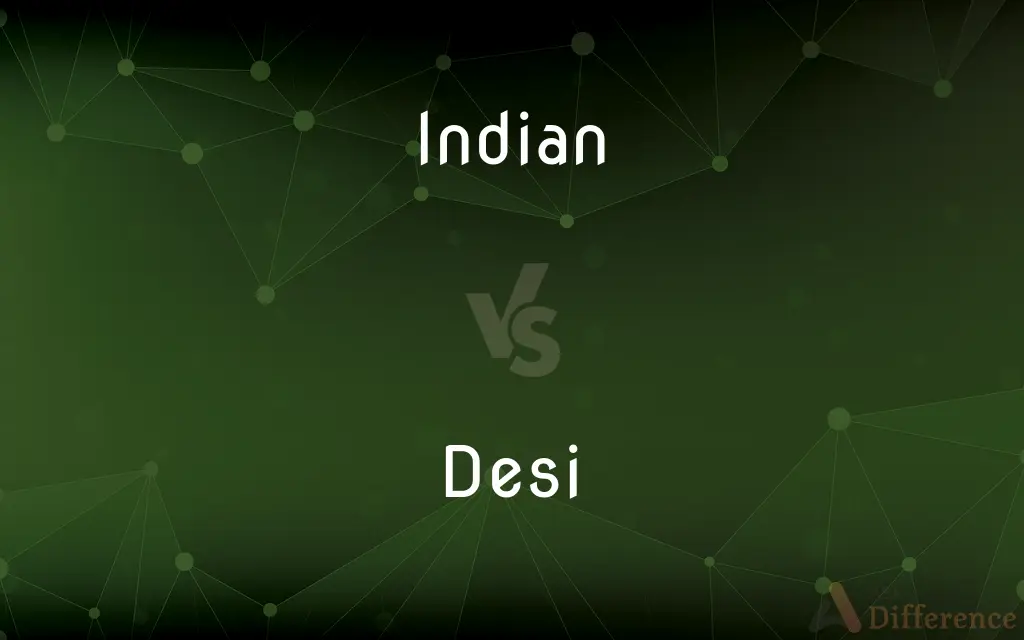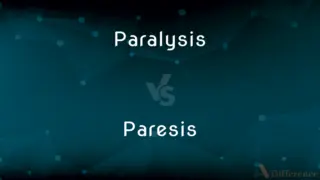Indian vs. Desi — What's the Difference?
Edited by Tayyaba Rehman — By Fiza Rafique — Updated on May 28, 2024
Indian refers to something or someone originating from India. Desi is a term for the people, cultures, and products of the Indian subcontinent or South Asian diaspora.

Difference Between Indian and Desi
Table of Contents
ADVERTISEMENT
Key Differences
"Indian" refers to a nationality and identity associated with India, a country in South Asia. "Desi," a term derived from Sanskrit, refers broadly to the peoples, cultures, and products of the Indian subcontinent, which includes India. Both terms are deeply rooted in cultural and social contexts but carry different connotations and scopes of identity.
When someone says they are Indian, they are stating their nationality or ethnic origin from India itself. On the other hand, when someone identifies as Desi, they are aligning themselves with a wider cultural heritage that transcends national borders, encompassing not just India, but also countries like Pakistan, Bangladesh, and Sri Lanka. Both identities can intersect but have distinct cultural implications.
Indian culture encompasses a wide array of traditions, languages, and practices specific to India. Desi culture, while inclusive of Indian customs, is often a term used in the diaspora to represent a collective identity for people from the Indian subcontinent. Both Indian and Desi cultures are rich in history and diversity, yet Desi can sometimes imply a more hybrid cultural identity.
In contemporary contexts, "Indian" can pertain to aspects directly related to India, such as Indian politics, Indian languages, or Indian cuisine. "Desi" can refer to a shared sentiment or hybrid lifestyle amongst South Asian communities, especially where diasporic communities foster shared cultural spaces. Both terms have their own place in discourse, with "Indian" often being more formal and "Desi" more informal and colloquial.
In the global diaspora, an Indian might specifically refer to someone from India, with a legal or citizenship implication. A Desi person might be of Indian descent but also includes those who are from various parts of the Indian subcontinent or whose ancestors were, thereby sharing a broad cultural heritage. Both terms can evoke a sense of community, but they differ in the breadth of their cultural and ethnic inclusivity.
ADVERTISEMENT
Comparison Chart
Geographic Origin
Specifically from India
From the Indian subcontinent
Nationality
Refers to the nationality of India
Transcends specific national identities
Usage in Diaspora
Used formally
Used formally
Cultural Scope
Pertains to India's specific culture
Encompasses broader South Asian culture
Inclusivity
National identity
Cultural identity across nations
Compare with Definitions
Indian
Pertaining to India or its people.
The Indian delegates were welcomed at the summit.
Desi
A person of South Asian descent living abroad.
He's a Desi residing in New York.
Indian
Related to the indigenous peoples of the Americas, often referred to as American Indians.
The Indian heritage was celebrated at the festival.
Desi
Relating to the culture or products of the Indian subcontinent.
They went to a Desi restaurant for dinner.
Indian
Belonging to the Indian subcontinent's flora and fauna.
The Indian tiger is a majestic animal.
Desi
Used by South Asians to self-identify in a familiar, informal way.
She loves connecting with other Desi people.
Indian
Associated with the products or cuisine of India.
Indian spices are popular worldwide.
Desi
Encompassing the lifestyle or ethos of South Asian origin.
Desi weddings are known for their vibrancy.
Indian
Of or relating to India or the East Indies or to their peoples, languages, or cultures.
Desi
Involving entertainment or media produced by the South Asian community.
Desi music blends traditional and modern genres.
Indian
Of or relating to any of the Native American peoples except the Aleut, Inuit, and Yupik.
Desi
Desi (; Hindustani: [d̪eːsi]) is a word used to describe the people, cultures, and products of the Indian subcontinent and their diaspora, derived from Sanskrit देश (deśá), meaning "land, country". Desi traces its origin specifically to the people of the countries India, Pakistan, and Bangladesh.
Indian
A native or inhabitant of India or of the East Indies.
Desi
Alternative form of Desi
Indian
A person of Indian or East Indian ancestry.
Desi
Alternative form of Desi
Indian
A member of any of the Native American peoples except the Aleut, Inuit, and Yupik.
Desi
A particular variety of cultivated chickpea.
Indian
Any of the languages of these peoples. See Usage Notes at American Indian, First Nation, Native American.
Indian
See Indus2.
Indian
Alternative case form of Indian
Indian
Alternative case form of Indian
Indian
Of or pertaining to India proper; also to the East Indies, or, sometimes, to the West Indies.
Indian
Of or pertaining to the aborigines, or Indians, of America; as, Indian wars; the Indian tomahawk.
Indian
Made of maize or Indian corn; as, Indian corn, Indian meal, Indian bread, and the like.
Indian
A native or inhabitant of India.
Indian
One of the aboriginal inhabitants of America; - so called originally from the supposed identity of America with India.
Indian
A member of the race of people living in North America when Europeans arrived
Indian
A native or inhabitant of India
Indian
Any of the languages spoken by Amerindians
Indian
Of or relating to or characteristic of India or the East Indies or their peoples or languages or cultures;
The Indian subcontinent
Indian saris
Indian
Of or pertaining to American Indians or their culture or languages;
Native American religions
Indian arrowheads
Indian
A citizen of India by law.
She holds an Indian passport.
Common Curiosities
Can a Pakistani or Bangladeshi person be called Indian?
No, they are Pakistani and Bangladeshi respectively; however, they can be referred to as Desi.
Is Desi a nationality?
No, Desi is not a nationality; it is a term signifying cultural connection to the Indian subcontinent.
Who can identify as Desi?
Anyone with cultural roots from the Indian subcontinent, regardless of their current nationality.
Do the terms Indian and Desi have the same cultural implications?
No, Indian is specific to India, while Desi encompasses a broader South Asian cultural identity.
What regions are included in the term Desi?
It includes India, Pakistan, Bangladesh, Nepal, Sri Lanka, Bhutan, and sometimes the Maldives.
Is Desi recognized as an ethnicity?
Desi is not officially recognized as an ethnicity; it's a cultural identifier.
What is the definition of an Indian?
An Indian is someone or something associated with the nation of India.
What does Desi mean?
Desi is a term that refers to the people, cultures, and products of the Indian subcontinent, commonly used by the South Asian diaspora.
Can the terms Indian and Desi be used interchangeably?
Not always, as Indian refers specifically to India, while Desi encompasses a wider cultural heritage including other South Asian countries.
Is the term Indian or Desi used in official documents?
Indian is used in official documents, while Desi is informal and not used in official contexts.
Does the term Desi have a historical origin?
Yes, it comes from the Sanskrit word "deśī," meaning "from the country" or "native."
Can Indian cuisine be referred to as Desi food?
Yes, Indian cuisine can be referred to as Desi food, along with other South Asian cuisines.
Can a person from the Indian diaspora be both Indian and Desi?
Yes, they can identify as Indian by nationality and Desi by cultural heritage.
How do people use the term Desi in the diaspora?
Desi is often used to create a sense of community among South Asians living abroad.
Are there any legal implications to identifying as Desi?
No, there are no legal implications; it is a cultural and social identity.
Share Your Discovery

Previous Comparison
Pier vs. Dock
Next Comparison
Paralysis vs. ParesisAuthor Spotlight
Written by
Fiza RafiqueFiza Rafique is a skilled content writer at AskDifference.com, where she meticulously refines and enhances written pieces. Drawing from her vast editorial expertise, Fiza ensures clarity, accuracy, and precision in every article. Passionate about language, she continually seeks to elevate the quality of content for readers worldwide.
Edited by
Tayyaba RehmanTayyaba Rehman is a distinguished writer, currently serving as a primary contributor to askdifference.com. As a researcher in semantics and etymology, Tayyaba's passion for the complexity of languages and their distinctions has found a perfect home on the platform. Tayyaba delves into the intricacies of language, distinguishing between commonly confused words and phrases, thereby providing clarity for readers worldwide.













































